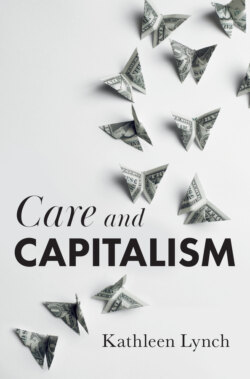Читать книгу Care and Capitalism - Kathleen Lynch - Страница 36
The material dividend of patriarchy
ОглавлениеTo understand how capitalism works, we need to go beyond capitalism and explore how it is constitutionally linked to the racial, gender and care ordering of society. The internal dynamics of gender itself are far from binary (Mitchell 1971). While patriarchy is a hierarchical system within which men dominate and control women, it is also a relationship between men. Men are hierarchically constituted within capitalism by class and co-constituted hierarchically by sexuality and race especially (Connell 1995). While hybrid types of masculinities exist, the White, upper-class, heterosexual male is symbolically at the pinnacle of the masculinities’ hierarchy. Men who are poor, working-class, Black or Brown, and/or gay or transsexual are variously located at the nether end of the male hierarchical order.
While some men find new ways to elevate themselves above other men, they often do so in a manner that does not threaten the symbolic boundaries that maintain the patriarchal dividend of their own kind. It is quite common for well-educated White middle-class men to differentiate themselves from ‘traditional’ men by highlighting their gender-aware ideologies, tastes and behaviours, while simultaneously retaining and protecting their male power in the gender hierarchy (Bridges and Pascoe 2014; Eisen and Yamashita 2019). As Hondagneu-Sotelo and Messner (1994) observed, White middle-class men want to stop paying a price for being at the pinnacle of the gender hierarchy (including the disrespect and criticism that comes from being defined as part of the privileged, undeserving elite) while at the same time wanting to remain part of that elite. As with all groups who benefit from privileges, they do not want to lose the material benefits of their superior (gender) status.
Although the vast majority of men do not belong to a normatively prescribed hegemonic group of (White) upper-class males, they benefit from the patriarchal dividend of being part of the male social group per se (Connell 1995: 79). They do not have to be proactive to benefit from the patriarchal dividend, nor do they have to defend it. Just as White people benefit silently from the racial dividend of whiteness, so all men can benefit from the patriarchal dividend of being a man, if they remain passive and silently complicit with its injunctions (Hartmann 1979; Connell 1995). Men’s complicity with the unequal gender order is highly visible in the care field and within families.
